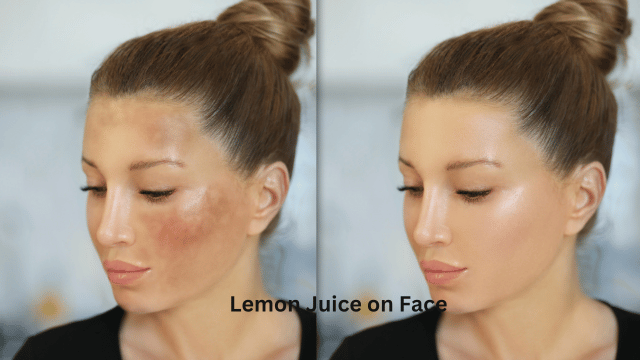Everybody has had those annoying black spots on their face that simply won’t go away. I’m constantly searching for natural solutions, and I’ve discovered that applying lemon juice to my face helps to fade these obstinate blemishes. It’s a straightforward, reasonably priced fix that goes hand in hand with the current clean beauty trend.
We’ll look at how to use lemon juice to lighten dark areas in this post. I’ll provide some simple recipes and advice to help you get better outcomes. In order to maximize the benefits of lemon juice treatments, we will also examine supplementary skincare techniques. By the end, you’ll know just how to use this zesty marvel to begin your path towards a more even, brighter complexion.
Lemon Juice Recipes for Dark Spot Treatment
I’ve found a few lemon juice recipes that work well for removing those lingering black spots. Let’s explore these home methods that use the vitamin C and citric acid in lemons to reduce hyperpigmentation.
Pure Lemon Juice Method
Although pure lemon juice can lighten dark spots, it must be used sparingly. The excessive acidity can cause irritation or even chemical burns by upsetting the pH balance of your skin. I usually dilute lemon juice with water before putting it on my face to reduce the danger. Always remember that consistency is essential, albeit it could take some time to realize results.
Lemon and Honey Mask
My favorite combo for a more delicate approach is this one. Lemon’s brightening qualities are complemented by honey’s anti-inflammatory and hydrating qualities. This is a basic recipe:
- Combine one tablespoon of raw honey and one teaspoon of lemon juice.
- After applying the mixture on your face, keep your eyes out of it.
- Turn it on for ten to fifteen minutes.
- After rinsing with warm water, pat dry.
- Apply a little moisturizer afterward.
Lemon and Yogurt Blend
I adore mixing yogurt and lemon for a more nutritious treatment. Yogurt’s lactic acid adds extra hydration and exfoliating . Give this mask a try:
- Combine one tablespoon yogurt and one teaspoon lemon juice.
- Apply to your face evenly.
- Keep it on for twenty to thirty minutes.
- Use cold water to rinse.
- Put on your preferred sunscreen and moisturizer.
Lemon juice might make you more sensitive to the sun, so always use sunscreen and perform a patch test before attempting any new treatments.
Enhancing Results: Complementary Skincare Practices
Complementary skincare practices are essential for optimizing the benefits of lemon juice treatments, in my opinion. Let’s investigate a few crucial tactics to improve our outcomes.
Consistent Sunscreen Use
The need for sun protection increases when we use lemon juice on our faces. Lemons can make our skin more vulnerable to UV radiation, which might cause irritation or even chemical burns. Before going outside, I always use a broad-spectrum sunscreen, especially after using lemon treatments. After applying lemon juice, it’s imperative to stay out of the sun right once to avoid photosensitivity responses.
Healthy Diet and Hydration
I’ve found that diet has a big influence on the condition of our skin. The natural radiance of our skin may be enhanced by eating a balanced diet high in vitamins and antioxidants. Because they are so full of nutrients that are good for the skin, I always make sure to include carrots and avocados in my meals. Maintaining proper hydration is also crucial. In order to maintain plump and beautiful skin, I try to drink at least 8 glasses of water every day.
Regular Exfoliation
I include light exfoliation in my regimen to enhance the natural exfoliating qualities of lemon. This facilitates the removal of dead skin cells and improves the penetration of lemon juice. I take caution, though, not to exfoliate too much because this might cause irritation, especially when mixed with the acidity of lemons.
Conclusion
Lemon juice is a natural and affordable solution for people who want better skin since it has a considerable effect on removing dark spots. You may use this citrus fruit to brighten your complexion by employing easy recipes and paying attention to important guidelines. Always dilute lemon juice, conduct a patch test, and use sunscreen to save your skin from any possible adverse effects.
It’s essential to combine lemon juice treatments with other skincare routines for optimal results. A well-balanced diet, regular hydration, and mild exfoliation can improve your outcomes. You may get a more even skin tone with persistence and patience.
FAQs
1. How long should I expect lemon juice to take effect on dark spots?
Using lemon juice for six to twelve months can help lighten black spots. The treatment might take up to two years for really black areas.
2. Does lemon work well to get rid of black spots on the face?
Because lemon juice is rich in antioxidants and vitamin C, it can help brighten dark spots. Nevertheless, because of its acidity, it may irritate the skin or trigger allergic responses. It’s best to combine lemon juice with calming substances like yogurt and honey to lessen this.
3. What is a five-minute quick fix for dark spot reduction?
A kind of beta hydroxy acid (BHA) called salicylic acid can be used to exfoliate dark areas fast. This chemical exfoliator works especially well on acne-related dark spots since it encourages the growth of new skin cells and eliminates dead skin layers.
4. How can I get rid of my face’s black spots in a week?
A number of natural treatments can hasten the fading of black spots:
- Sip on lots of water to keep your skin hydrated.
- Apply a yogurt and lemon juice face mask.
- Make use of buttermilk, which brightens skin.
- To lighten and soothe the skin tone, use aloe vera.
- Make use of tomatoes, as they have lycopene, which helps lighten dark spots.
- Use papaya, which has antiseptic qualities of its own.
- Apply honey to your skin; it will cure and hydrate it.











